35 Fast-Food 'Facts' That Are Actually False
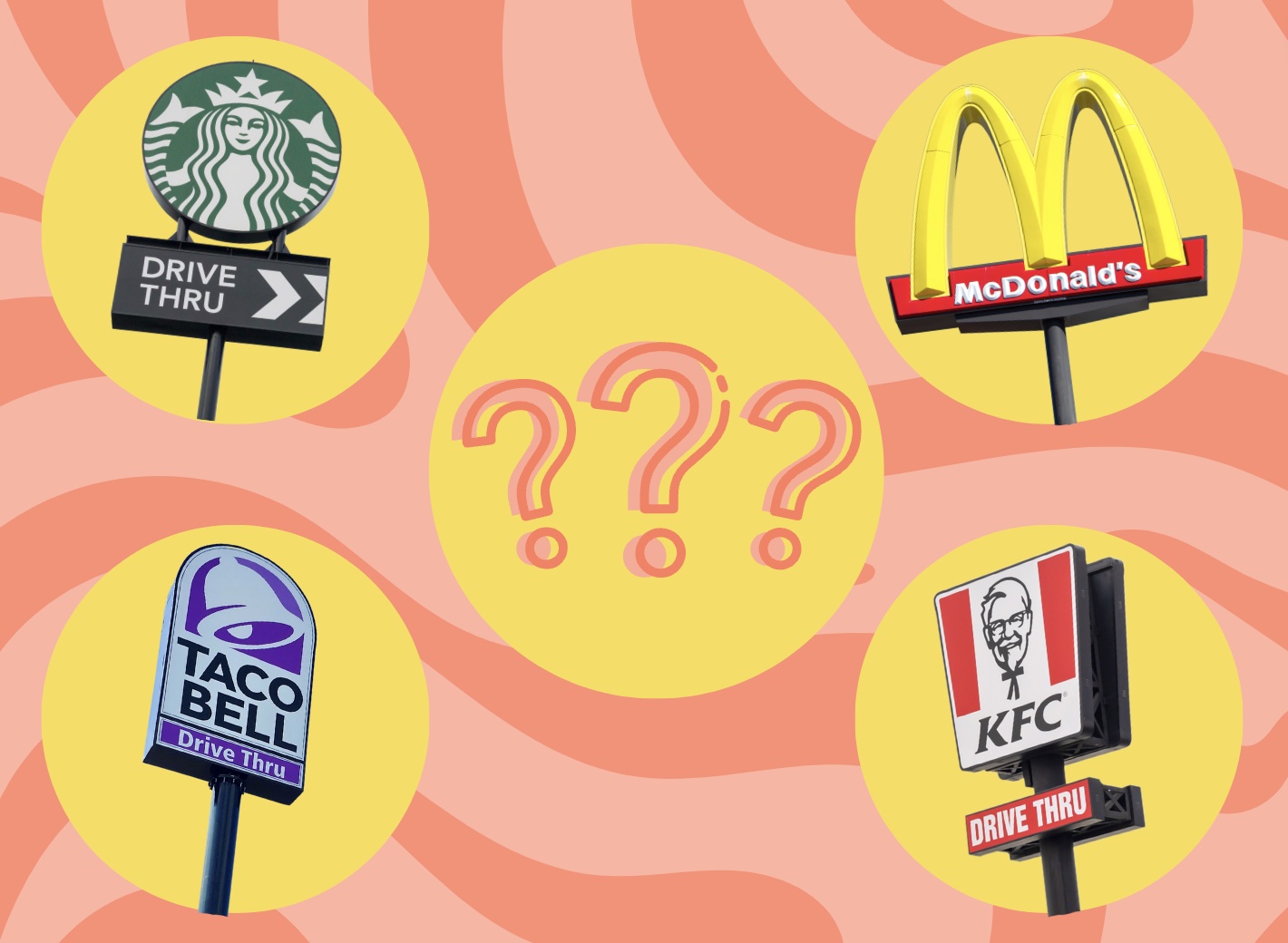
Whether you eat it frequently or avoid it religiously, there's no denying that fast-food is a quintessential part of American dining. According to the industry research company IBISWorld, there were more than 200,000 fast-food businesses in the United States as of 2023. Survey findings published in 2018 also revealed that 36.6% of American adults consumed fast-food on a given day between 2013 and 2016. This data, in other words, shows that there are fast-food restaurants galore in America, and Americans are consistently gobbling up their grub.
Perhaps because it has become such a universal part of American diets, fast-food frequently finds itself at the center of controversy. Shocking rumors and claims have plagued some of America's biggest fast-food chains for decades, taking aim at everything from their food quality to company policies. But are any of them true? To help separate fact from fiction once and for all, we've dug into all of the most prevalent fast-food rumors and compiled the ones that turned out to be nonsense.
Read on for 35 supposed "facts" about your favorite fast-food chains that are actually false!
KFC's founder was a real colonel
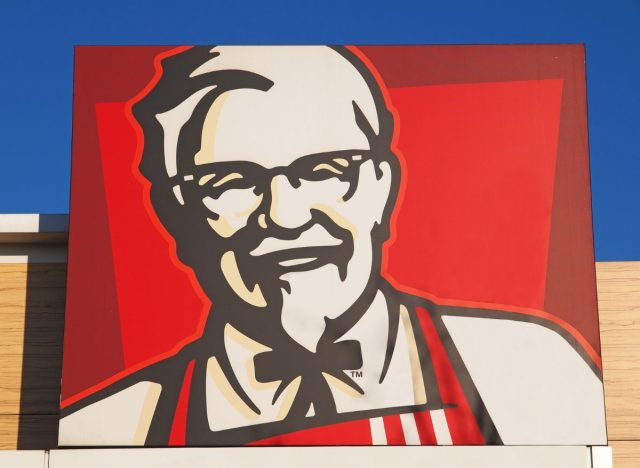
Colonel Harland Sanders, KFC's legendary white-clad founder, is one of the most recognizable faces in the world of fast-food. But despite what his title implies, he was never actually a bonafide "colonel."
According to the History Channel, Sanders enlisted in the U.S. Army in 1906 and served in Cuba for a few months before he was honorably discharged. It wasn't until 1935 that Kentucky's governor at the time, Ruby Laffoon, issued a decree that celebrated Sanders as an honorary colonel. So, while he technically bears the "colonel" title, he didn't receive it by moving up in the army's ranks.
MSG is proven to be bad for you
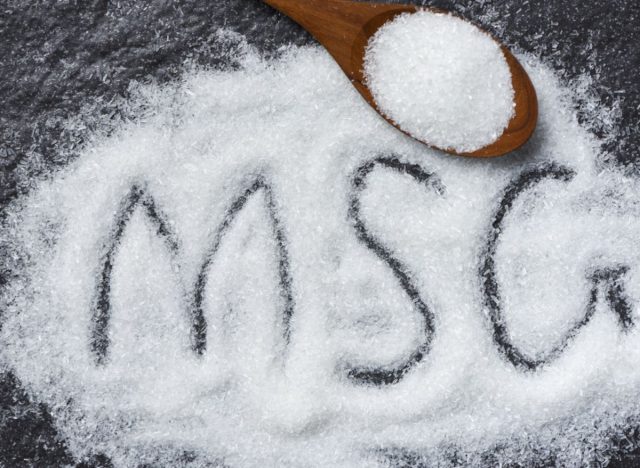
Monosodium glutamate (MSG) has a troubled place in the world of fast-food. Many chains, such as Chick-fil-A, use it the salt-like substance as a flavor enhancer to give their food an addictive umami kick. However, it developed an unsavory reputation after consumers began claiming that they experienced unpleasant side effects like headaches, fluttering heartbeats, chest pain, nausea, and weakness after eating food that contained MSG.
Consumers are certainly free to avoid MSG if they wish. But the truth about this controversial ingredient is that the U.S. Food and Drug Administration (FDA) generally recognizes it as safe in food. Furthermore, researchers have never been able to find definitive proof MSG causes those symptoms, according to the Mayo Clinic.
Taco Bell's Cinnamon Twists are just deep fried pasta
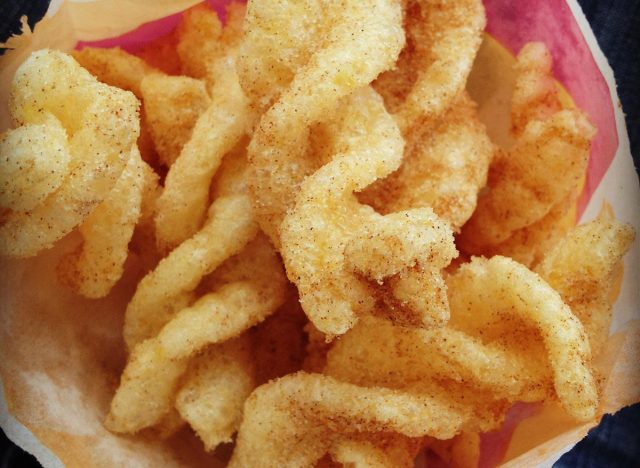
For more than a decade, Taco Bell has contended with rumors that its Cinnamon Twists are just rotini pasta that has been deep fried and tossed with cinnamon sugar. The rumors had something of a resurgence in 2019 when a viral TikTok video revived the claim once again, according to the fact-checking site Snopes.
The confusion seems to stem from the fact that in pictures allegedly showing the Cinnamon Twists before they're cooked, the treats do resemble dried pasta. However, just because the uncooked twists look similar to pasta doesn't mean they're actually the same as dried noodles sold at grocery stores. It also doesn't mean that you can perfectly recreate Cinnamon Twists at home by pouring boxed rotini into a deep fryer. According to the Taco Bell website, the "twist" element in the Cinnamon Twists is made from wheat flour, yellow corn meal, rice flour, and salt.
KFC serves lab-grown meat
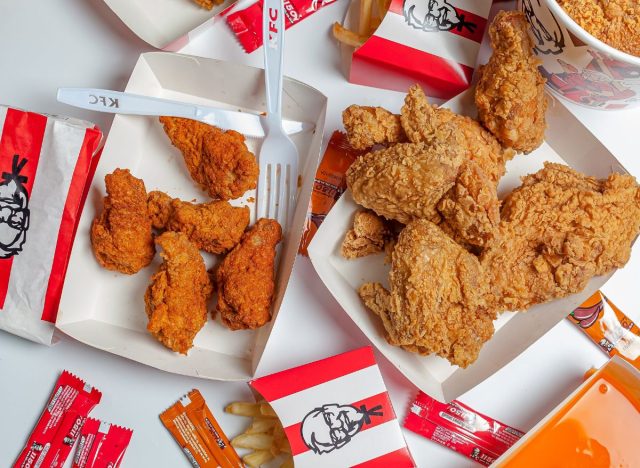
In June 2023, regulators in the United States approved two California companies to start selling "lab-grown" chicken (aka cultivated meat, which is grown using chicken cells) for the very first time. Soon after, posts began circulating on Facebook that KFC had either already started serving lab-grown chicken in its restaurants or had partnered with lab-grown meat companies.
The claims immediately horrified customers, but fear not! They're far from the truth. A spokesperson confirmed to USA Today that KFC Russia once experimented with cultivated chicken in 2020 when the chain used to operate in the country. However, that "was just a one-time experiment and not part of a long-term strategy," the spokesperson said. KFC doesn't currently serve lab-grown meat at its restaurants in the United States or beyond.
As previously noted, American regulators only approved two companies to start selling lab-grown chicken back in June. KFC was not one of them.
Arby's serves meat made from "liquid" or "gel"
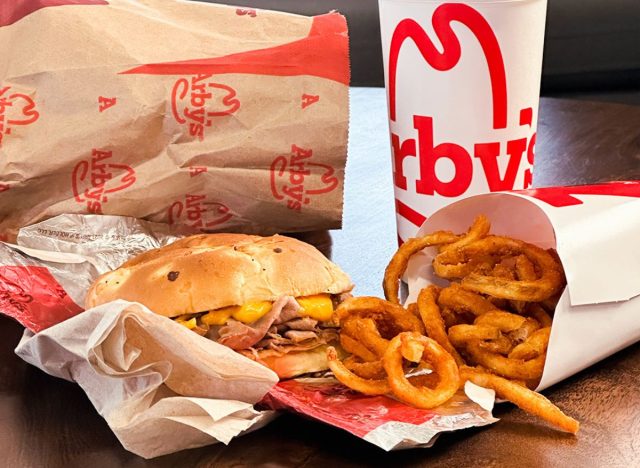
Arby's has long been dogged by unsettling claims that its famous roast beef isn't real beef. These rumors have alleged that Arby's actually uses a liquid, gel, powder, or paste that has been reconstituted and shaped into something resembling real meat.
However, Snopes looked into the claims back in 2005 and declared them false. An Arby's spokesperson confirmed to the fact-checking site that the chain's roast beef consists entirely of beef and a self-basting solution. Actual Arby's employees also told Snopes that the beef arrives in bags that contain a gelatinous broth, which some might mistake for the meat itself.
Burger King admitted to selling burgers that contained horse meat
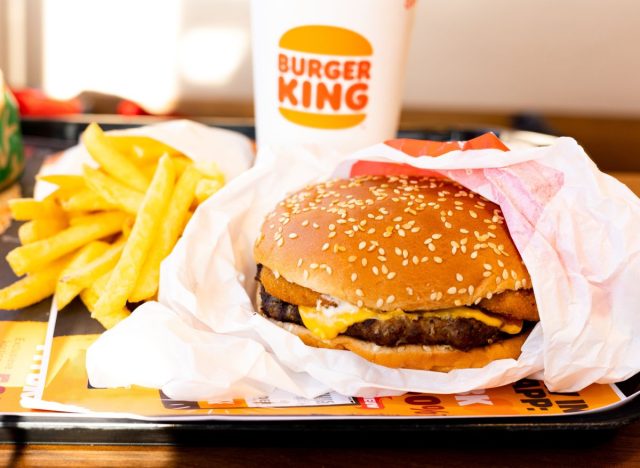
Don't worry—the meat in your Burger King meal doesn't actually come from a horse. But a false news report that circulated a few years back wanted you to believe the opposite.
In 2015, an unreliable website called Before It's News claimed in an article that Burger King had "now admitted after continuous denial that it has actually been selling UK customers both burgers and Whoppers that contain horsemeat."
In actuality, Burger King never admitted anything of the sort. According to Snopes, which fact-checked the article and declared it false, Burger King did announce in 2013 that trace amounts of horse DNA had been discovered at one of its suppliers' plants. Burger King never actually found any horse DNA in its actual burgers, but immediately cut ties with the supplier out of caution.
The Before It's News post intentionally misrepresented the years-old horse DNA story to make it seem like Burger King was currently selling burgers with horse meat to customers, Snopes said.
McDonald's was caught using human meat
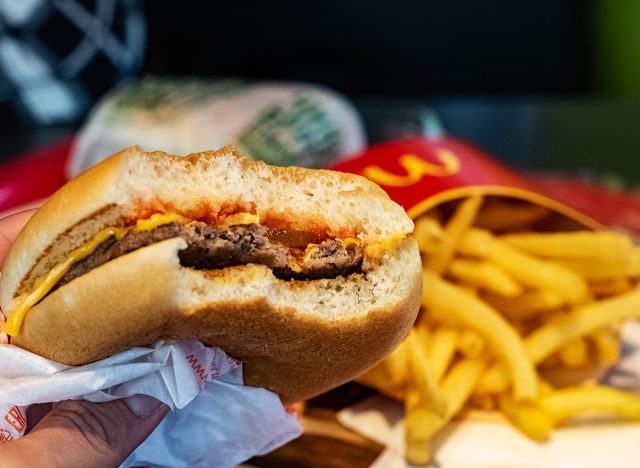
Just imagine the mania that would ensue if McDonald's were actually ever caught using human meat. An article published in 2014 made that very allegation against the company, claiming that both human and horse meat were discovered inside the freezer at a McDonald's meat factory in Oklahoma City.
Luckily, this report was easy to debunk. Snopes declared the claim false and noted that the article was published by Huzlers, a website known for publishing satire news. Moreover, no credible news sites ever reported the false claim as true, though multiple have fact-checked it.
Wendy's is going out of business
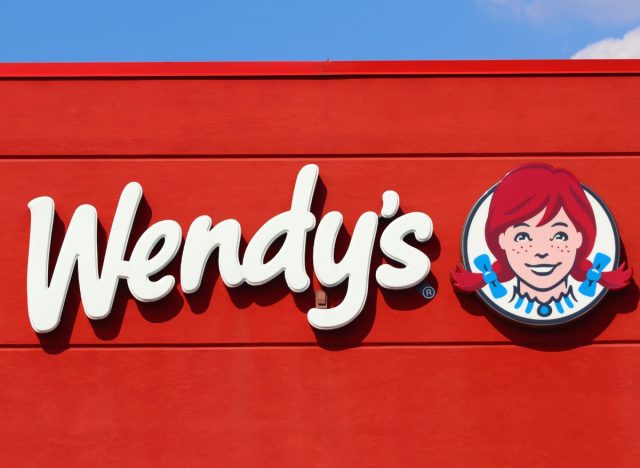
Posts began circulating on social media last year that implied Wendy's was shutting down for good—but, of course, you shouldn't believe everything you read online.
According to Snopes, two misleading advertisements popped up on Facebook and Instagram in October and November 2023 that featured a photo of Wendy's founder Dave Thomas. Both advertisements included the caption "Closing Time: All The Restaurant Chains Closing," so the use of Thomas' picture implied that Wendy's was one of the chains purportedly going out of business.
However, one of the advertisements linked to an old article that didn't mention Wendy's at all. The other linked to an article that mentioned a former Wendy's franchisee had sold its restaurants to another operator, but noted that Wendy's itself isn't going out of business, Snopes said. So, rest assured that you won't lose access to Wendy's Baconators, Frosty treats, or fries anytime soon.
McDonald's Chicken McNuggets are made from pink slime
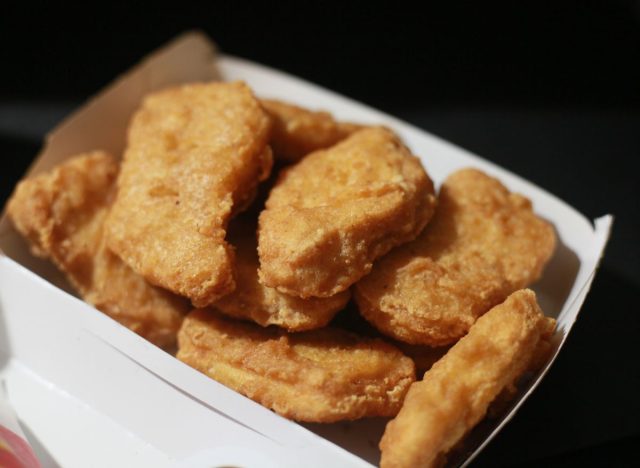
Rumors and questions have long abounded on the internet regarding whether McDonald's uses so-called "pink slime" or "pink goop" in its Chicken McNuggets. You might have even seen photos or videos of the paste-like, finely ground meat concoction that could easily be mistaken for strawberry ice cream. However, McDonald's has repeatedly confirmed that its nuggets do not contain pink slime, and that those images and videos have absolutely no connection to McDonald's.
"Each and every one of our Chicken McNuggets is made with USDA-inspected boneless white-meat chicken—cut from the chicken breast, tenderloins and rib meat," McDonald's said in a 2021 statement.
McDonald's Canadian arm even released a video back in 2014 showing the entire nugget-making process, and indeed, there was no pink slime in sight.
In-N-Out has a secret menu
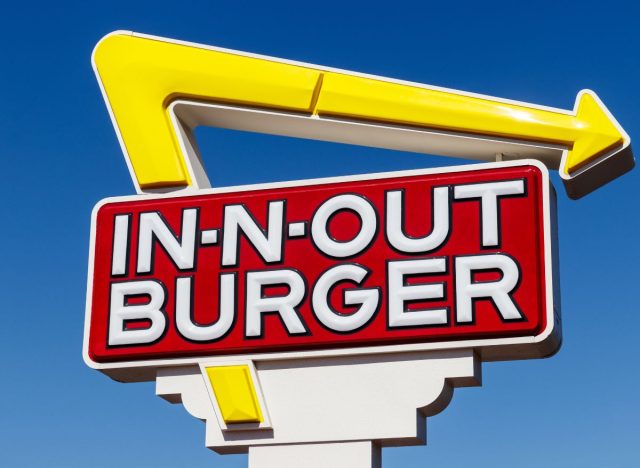
In-N-Out Burger's "secret menu" is practically just as famous as its original menu—and for good reason. It's not really a secret at all! The chain proudly lists several of the most popular options from its "Not So Secret Menu" on its website, including Animal Style, Protein Style, and even the Triple Triple.
KFC breeds six-winged, eight-legged chickens
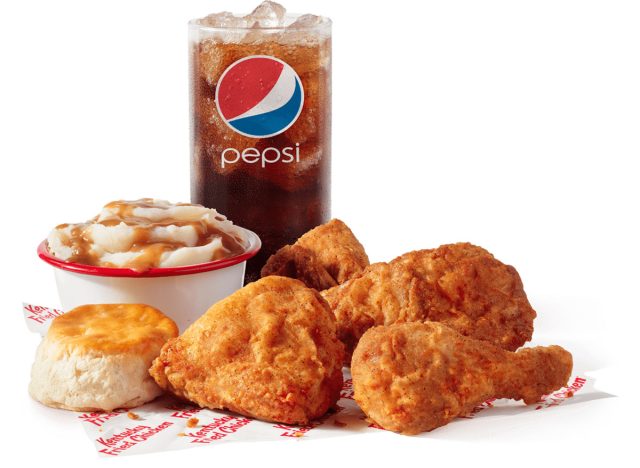
With more than 29,000 locations scattered throughout the globe, KFC certainly has to produce a lot of chicken in order to feed the fast-food-loving masses. However, contrary to some widely circulated rumors, the company isn't so committed to keeping its restaurants well-stocked that it breeds mutant chickens with extra meat.
Several years ago, false claims and doctored photos emerged on the social media platform WeChat alleging that KFC served genetically modified chickens with six wings and eight legs, the Washington Post reported. The chicken chain has categorically denied those rumors, and parent company Yum Brands even successfully sued three tech companies for helping to spread the misinformation by allowing the claims and photos to be posted on social media.
McDonald's makes its soft serve with pig fat
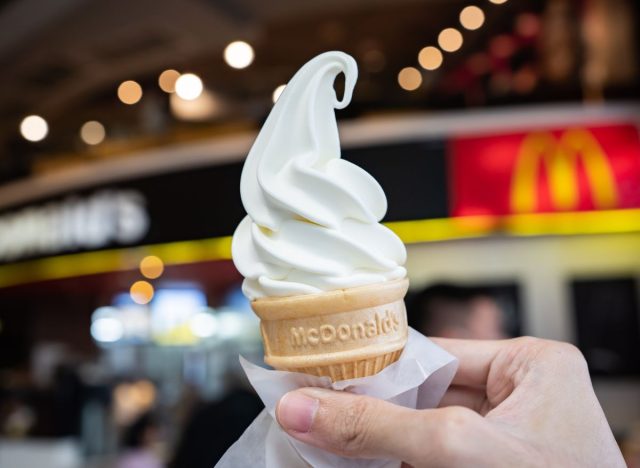
It's not exactly clear where this odd myth originated, but it's out there nevertheless. For years, the internet has been rife with rumors and confusion about whether McDonald's soft serve contains pig fat. But fear not, dairy lovers! The company lists the ingredients for its vanilla soft serve, as well as for every other menu item, on its website. Spoiler alert: pork fat is not one of them.
Popeyes' chicken was once laced with cocaine
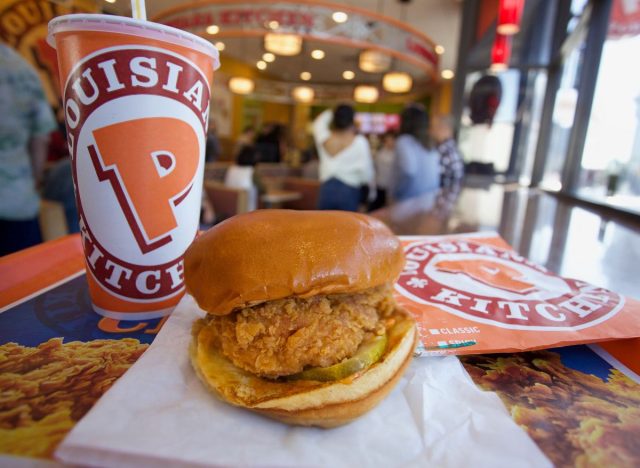
Don't worry—that addictive quality you might detect in your Popeyes' fried chicken doesn't come from illegal narcotics. Back in 2017, a false online news report claimed that a Popeyes manager was arrested for dipping chicken into a "cocaine based-flour" in order to boost sales. Snopes looked into the matter and discovered that the fake report had been posted on a prank news generator site, thus debunking it once and for all.
McDonald's French fries are vegan
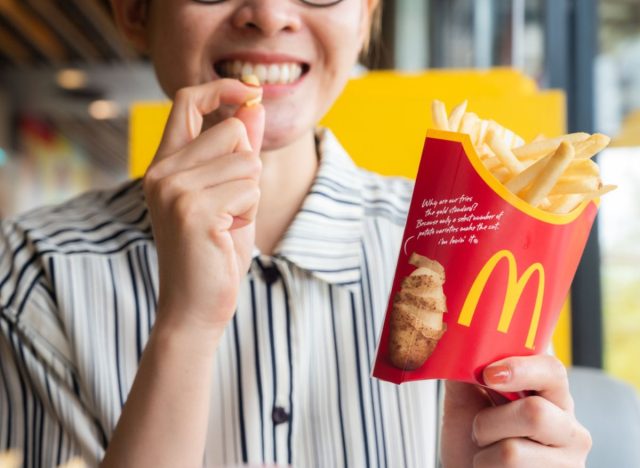
McDonald's fries are salty, crispy, and golden brown when executed right. But, one thing the fries aren't is vegan—a fact that has shocked McDonald's fans who believed otherwise in the past.
The chain cooks its fries in an oil blend with a beef flavoring that contains hydrolyzed milk, according to the ingredients statement on the McDonald's website. So, if you follow a vegan diet, you'll want to steer clear of McDonald's fries.
Starbucks' Pumpkin Spice Lattes contain dangerous chemicals
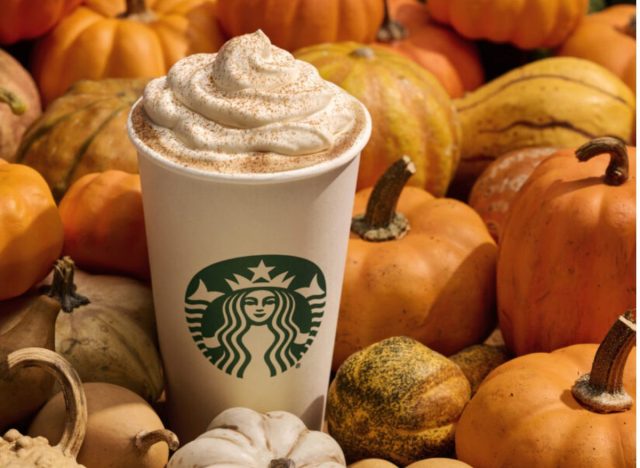
Back in 2014, a graphic was posted on social media making the serious allegation that Starbucks' famous Pumpkin Spice Latte contained harmful toxins. However, Snopes looked into the claims and declared them false. For example, one of the allegations was that a caramel coloring ("caramel color IV") used in the coffee drink at the time was carcinogenic. However, the U.S. Food and Drug Administration says that it doesn't believe that the substance presents any immediate or short-term health risks.
For the record, Starbucks lists the ingredients for all of its menu items online, so you can always check if you want to confirm exactly what's in your food and drinks.
McDonald's food won't decompose
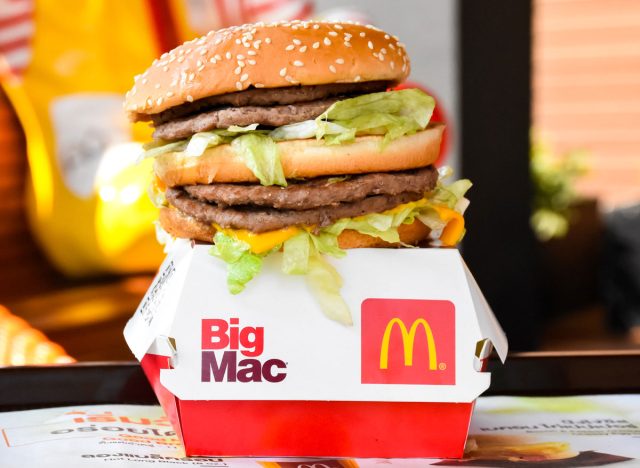
If you know where to look online, you'll encounter rumors and claims that McDonald's food never decomposes. There have been reports in the past about McDonald's food that remains remarkably well-preserved long after it was made. For example, one McDonald's customer in Iceland reportedly stashed a McDonald's burger and fries and found that they still looked surprisingly similar years later, per TODAY.com.
However, that doesn't mean that any food item from McDonald's will stay perpetually intact and unblemished. McDonald's addressed the claims on its website in 2020, saying that its food could decompose "in the right environment."
"But, in order to decompose, you need certain conditions – specifically moisture. Without sufficient moisture – either in the food itself or the environment – bacteria and mold may not grow and therefore, decomposition is unlikely," McDonald's continued. "So if food is or becomes dry enough, it is unlikely to grow mold or bacteria or decompose. Food prepared at home that is left to dehydrate could see similar results. Look closely, the burgers you are seeing are likely dried out and dehydrated, and by no means 'the same as the day they were purchased.'"
Wendy's Chili is made from grill scrapings
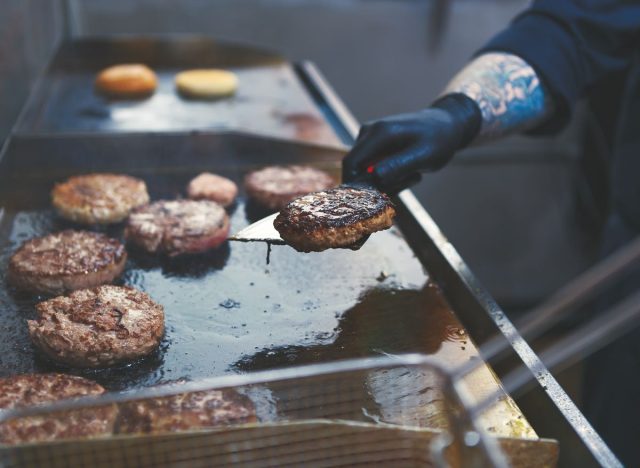
Contrary to rumors and questions that have permeated the internet, Wendy's famous chili is not made from the unwanted bits left over on the grill after cooking burgers. In fact, the chain is very transparent about its chili-making process. According to the Wendy's website, founder Dave Thomas came up with the idea to prevent leftover burger beef from going to waste by turning it into chili. This means that you'll find the same kind of beef in your Wendy's chili as you will in your Wendy's burger.
McDonald's Apple Pies aren't made from apples
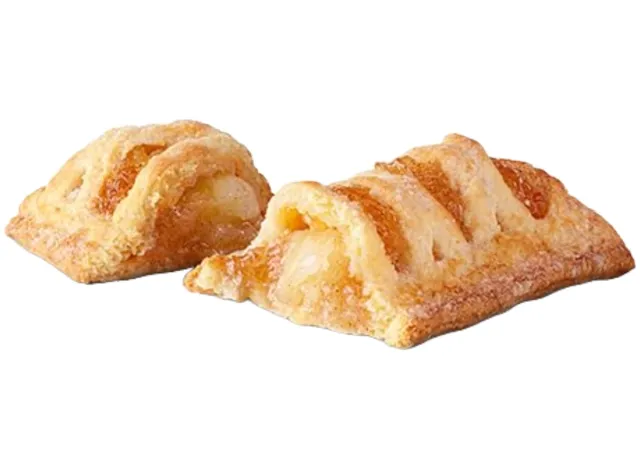
As the biggest fast-food chain in the country by sales, it should come as no surprise that McDonald's is at the center of more than a few fast-food myths. Yet another example is the years-old rumor that the chain secretly uses potatoes rather than apples in its Baked Apple Pie, presumably because the tubers are cheaper substitutes for the fruit.
However, McDonald's does not list potatoes in the ingredient statement for its Baked Apple Pie. Both Snopes and McDonald's have debunked the claim as well.
"McDonald's apple pie has real diced apples. The exact variety can vary from season to season, but we look for apples that are sweet and slightly tart," McDonald's said in a statement in 2021.
Taco Bell serves low-quality "Grade D" meat
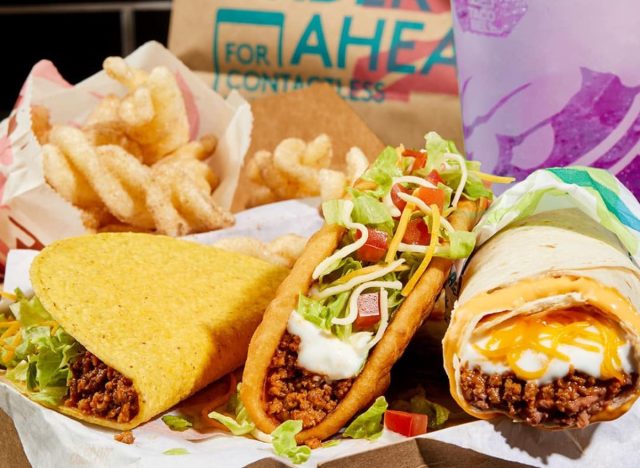
The old rumor that Taco Bell served "Grade D" beef made from lower-quality parts of the cow was unsettling, to say the least. But, in actuality, there's nothing to it.
As the USDA explains on its website, the United States doesn't grade most ground beef. Also, the kinds of beef that do get graded don't even receive letter grades. Instead, they're referred to as either Prime, Choice, Select, Standard, Commercial, Utility, Cutter, or Canner.
Here's the truth about Taco Bell's seasoned beef, straight from the chain's website: it's made from 100% beef that's cooked, drained, seasoned, packaged with water for added moisture, and then shipped to restaurants.
McDonald's burgers use worms as filler
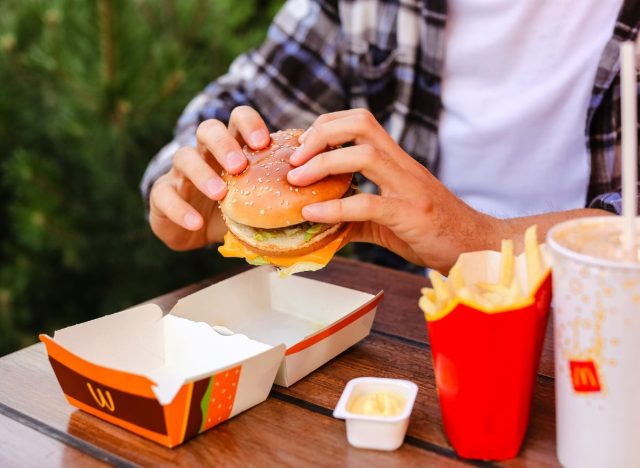
The rumor that McDonald's tries to protect its bottom dollar by using worms as cheap filler has circulated for decades, but has never stopped being false, according to Snopes. One of the most recent instances in which the rumor flared up again was when the faux news site Daily Buzz Live posted an article reviving the claim in 2017. But, per the McDonald's website, the burger patties only contain 100% beef with no fillers or extenders.
Starbucks has a secret menu
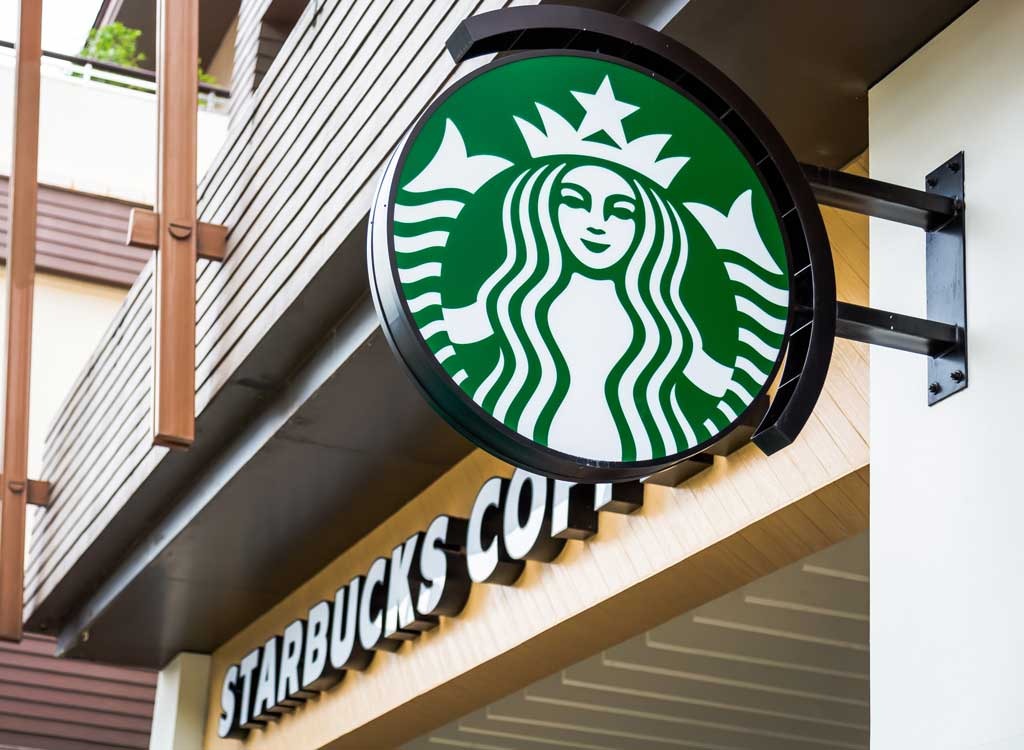
The internet is rife with chatter about Starbucks' best "secret menu" options, or drinks that the chain doesn't advertise but will make for you if you ask.
But, in reality, there isn't a list of secret beverages that only Starbucks employees and insiders know about. Most "secret menu" items are just existing Starbucks drinks with a couple of smart customizations. A perfect example is the Pink Drink, a former option on the so-called secret menu that was eventually added to the real menu. The drink is just a Strawberry Açaí Refresher mixed with coconut milk instead of water. You could just as easily claim that a latte with an extra pump of flavor syrup is a secret menu item.
KFC changed its name because it doesn't actually serve chicken
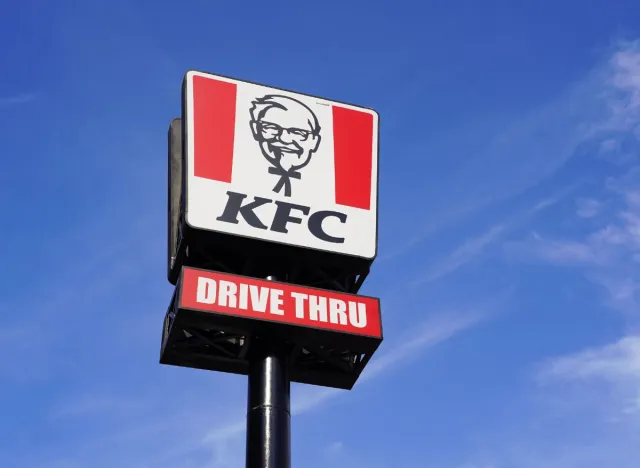
Remember that other KFC myth about the chain serving genetically modified chickens with six wings and eight legs? Believe it or not, that's not the only time that KFC has been accused of using mutant birds.
In 1991, the chain formerly known as Kentucky Fried Chicken officially shortened its name to KFC. Rumors emerged online years later that KFC made the name change for a very unexpected reason.
According to Snopes, people claimed that KFC was using chickens that had been genetically modified so they didn't have beaks, feathers, or feet. Supposedly, this was to eliminate the need to pluck the feathers and remove the beaks and feet from the birds. The rumor also alleged that the birds had a shrunken bone structure so KFC could get more meat out of them.
So, when the USDA allegedly stepped in and told KFC that it couldn't legally market the mutant poultry as "chicken," the chain tried to sidestep the issue by removing any mention of "chicken" in its name, menu, and marketing, the rumors alleged.
KFC vehemently denied the claims, and Snopes also declared them as false. The fact-checking site noted that those types of genetic modifications weren't feats that the science of the time could achieve. If you look at the KFC website, you'll also see that the word "chicken" is mentioned numerous times.
In reality, KFC changed its name for several reasons, including to distance its brand from the word "fried," Bloomberg reported at the time.
McDonald's burgers contain eyeballs
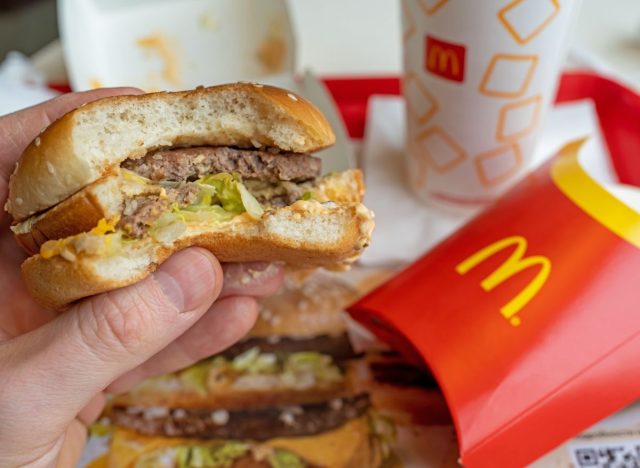
Will the rumors about undesirable ingredients in McDonald's food ever cease? Quite like the false claim that McDonald's secretly used worms as filler in its burgers, rumors that McDonald's blends cow eyeballs into its beef patties have been around for decades.
But, as previously mentioned, the McDonald's website reveals that the burger patties only contain 100% USDA-inspected beef with no fillers or extenders. And as Snopes pointed out when it fact-checked the claims and declared them false, the USDA doesn't allow random cow parts to be marketed as "beef."
Taco Bell serves horse meat
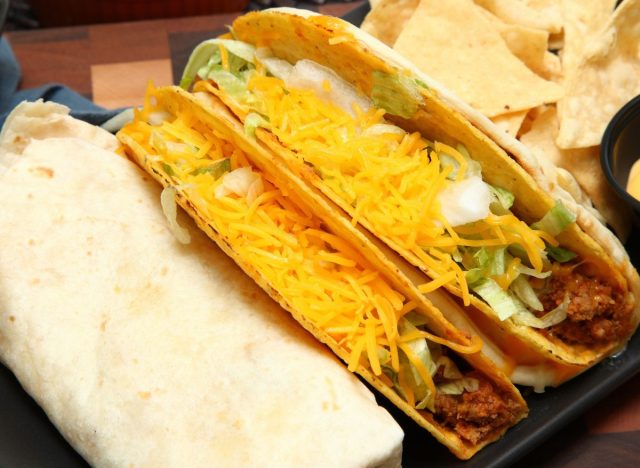
Taco Bell did discover traces of horse meat in the ground beef from one of its European suppliers back in 2013, according to CNN. However, contrary to rumors you might find online, that doesn't mean the chain as a whole serves horse meat to its customers.
Taco Bell acted immediately after discovering the horse meat traces and took beef off of the menu at its outlets in the United Kingdom until the issue was remedied. It also assured its American customers that none of its restaurants in the United States were impacted because they didn't serve meat from Europe. So, even though the horse meat discovery was certainly an unsettling development, it's not a continuing issue at Taco Bell.
Popeyes served a rat head
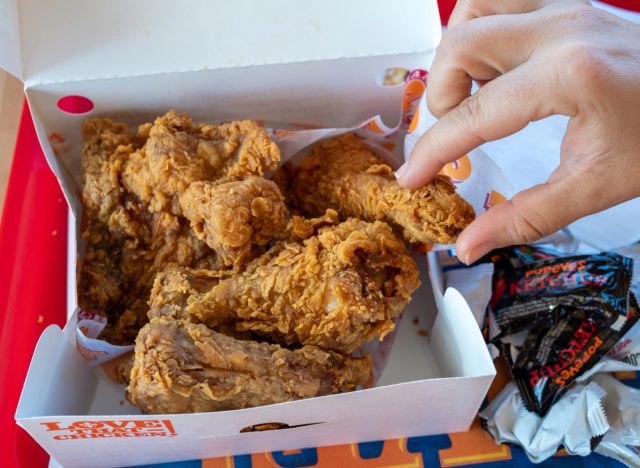
In 2016, a Popeyes customer shared an image on social media showing what she alleged was a rat head that she found in an order of fried chicken. The claim was subsequently shared widely on social media, so Snopes contacted Popeyes regarding the issue
A Popeyes spokesperson told the fact-checking site at the time that the customer initially arranged to meet with someone from the company to give them a sample of the alleged rat head for testing. However, the customer postponed the meeting, so they weren't able to obtain a sample to confirm it was a rat head, the spokesperson said.
The spokesperson added that Popeyes had spoken with suppliers about the issue and they believed the supposed rat head might have actually been a chicken organ. While it certainly wouldn't be pleasant to find a chicken organ when you weren't expecting it, it's still much less unsettling than finding a piece of deep fried rat.
Starbucks refused to provide coffee to the military
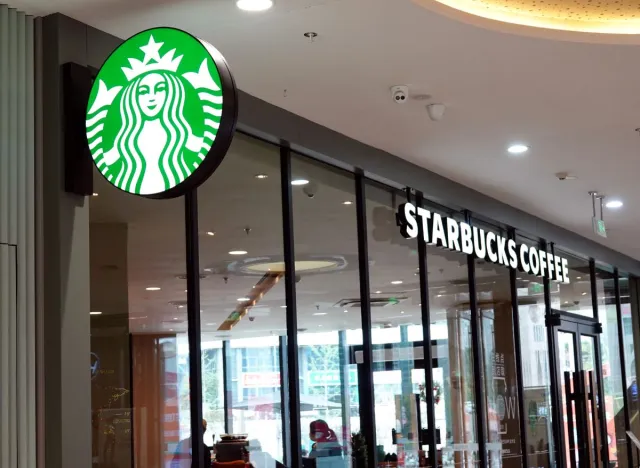
In 2004, a message began circulating via email with some serious—and false—allegations about Starbucks. The message alleged that Starbucks refused a request from Marines serving in Iraq at the time to provide them with free coffee grounds. Starbucks also allegedly said that it didn't support the conflict there and anyone who participated in it.
However, according to Snopes, the person who initially sent out the email sent out a retraction soon after. Starbucks has also vehemently denied the rumor.
Jack in the Box serves kangaroo meat
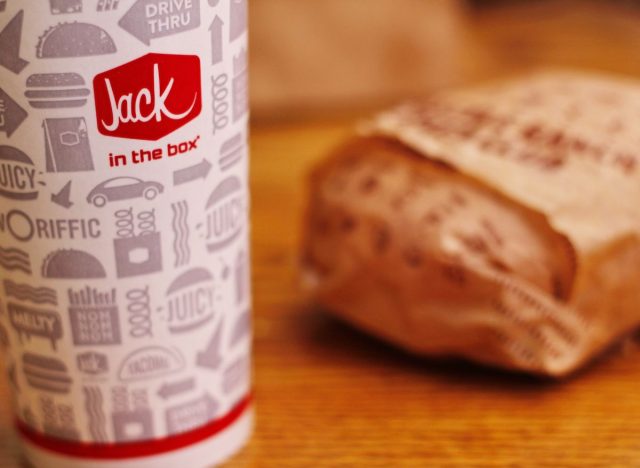
Rumors and questions are plentiful on the internet regarding whether Jack in the Box's food contains kangaroo meat, but is there any truth to them? Well, the chain did have a brush with controversy in 1981 when horse meat from Australia labeled as beef was discovered at a processing plant for one of Jack in the Box's suppliers, according to a report from The New York Times archives.
However, no reports mention that kangaroo meat was also discovered at the supplier's plant. The confusion might have something to do with the fact that Australian authorities found kangaroo meat in beef shipments heading for the United States around the same time, per the Times report.
In-N-Out is heading to NYC
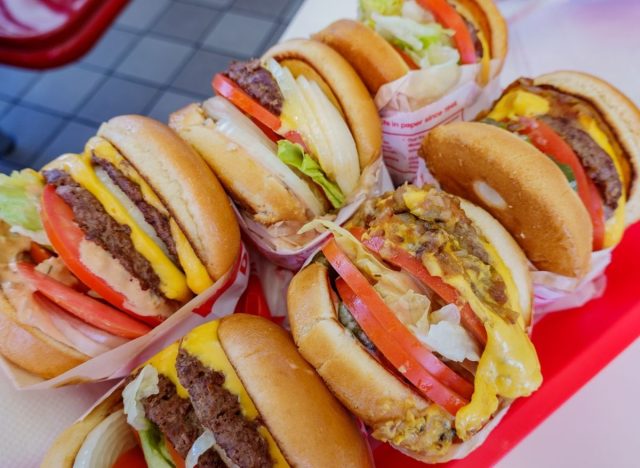
In-N-Out Burger fans have been begging the beloved regional burger chain to expand beyond the West for years. So, when people spotted a sign in New York City in 2010 proclaiming that In-N-Out would open there that summer, it was major news.
However, In-N-Out confirmed to Gothamist at the time that the sign was just a joke and it didn't have any plans to open in NYC. So, those on the East Coast still have to travel to California, Texas, or one of the handful of other states In-N-Out operates in to get their fix of burgers and fries for now.
Arby's name stands for roast beef
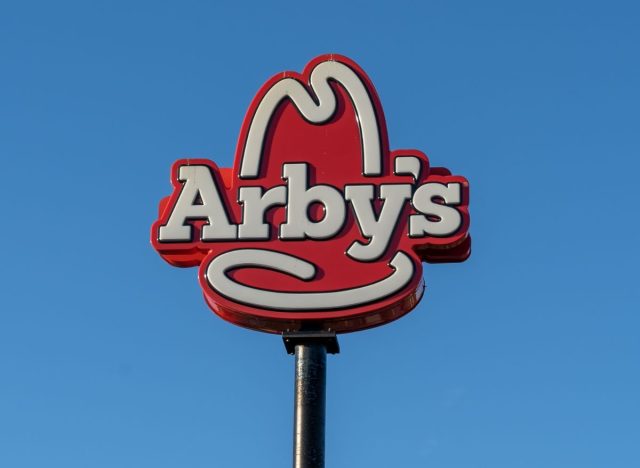
In a now-deleted tweet from 2018, one user on the X social media platform (then known as Twitter) claimed that Arby's name was just the phonetic spelling of the chain's popular roast beef, Business Insider reported. However, Arby's quickly shut down the rumor by responding to the post with the following message:
"Most people think that, but our name is actually based on the initials of our founders, the Raffel Brothers," the chain wrote.
KFC once served a customer a fried rat
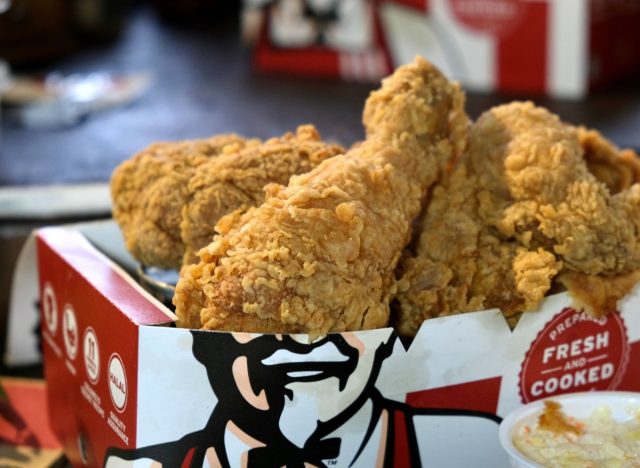
Out of all the myths plaguing the world of fast-food, this one is probably one of the most infamous. In 2015, a consumer set off a firestorm when he posted pictures on social media of an alleged fried rat, tail and all, in his KFC chicken tenders.
KFC proclaimed it as a hoax soon after, according to Snopes. And when the customer's lawyer handed over the supposed rat for testing at an independent lab, the tests revealed that it was just chicken all along, the Independent reported.
Tim Hortons' coffee contains nicotine
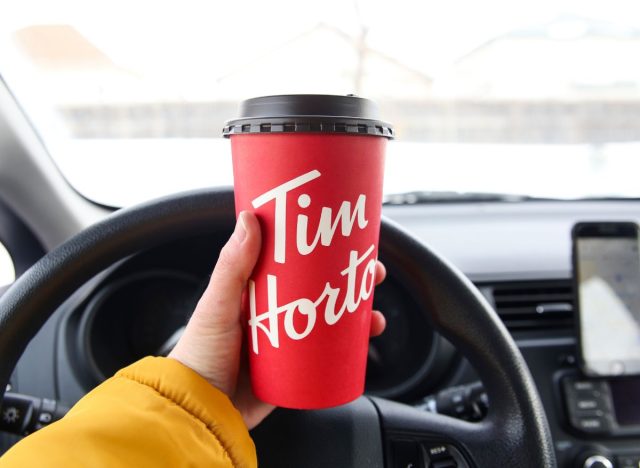
Tim Hortons is a massive player in the world of coffee chains, with nearly 4,000 restaurants across Canada alone. But despite some claims that you might find online or via gossip, the secret to the chain's success isn't an odious one. Years ago, Tim Hortons got caught up in a conspiracy that its coffee was laced with nicotine, monosodium glutamate (MSG), or even an unusually high amount of caffeine to keep customers coming back again and again.
However, Snopes fact checked the claims and declared them false. It noted that, like the U.S. Food and Drug Administration we have in America, Canada has its own regulatory agency that ensures the food that consumers eat is safe. The agency certainly would not allow a restaurant chain to serve substances as notable as those without making the public aware of it.
A Wendy's customer found a finger in the chili
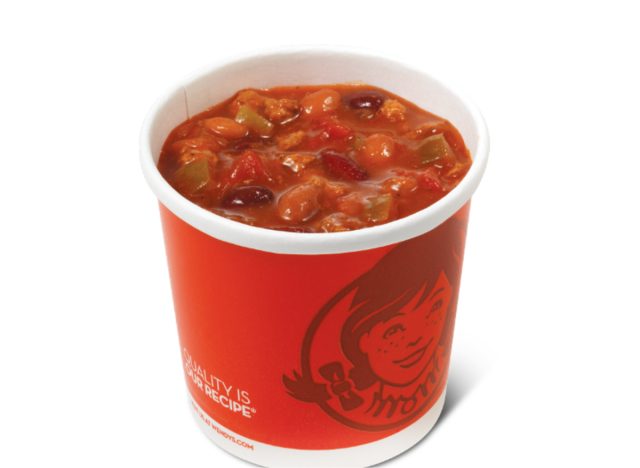
If you were tuned into the news cycle in 2005, you might remember when a Wendy's customer made the shocking claim that she found a piece of severed human finger in her chili, something that could put anyone off of eating fast-food for life. The news made major headlines and reportedly resulted in tens of millions of dollars in lost business for the burger chain, but the whole thing turned out to be a scam.
The Wendy's customer who made the allegation, Anna Aayala, later admitted that she planted the severed finger as part of an extortion scheme with her partner. Police ultimately discovered that Aayala's partner had gotten the finger from an associate who lost it during an industrial accident. Both were charged and faced years of prison time over the crime, The New York Times reported.
McDonald's funded the IRA
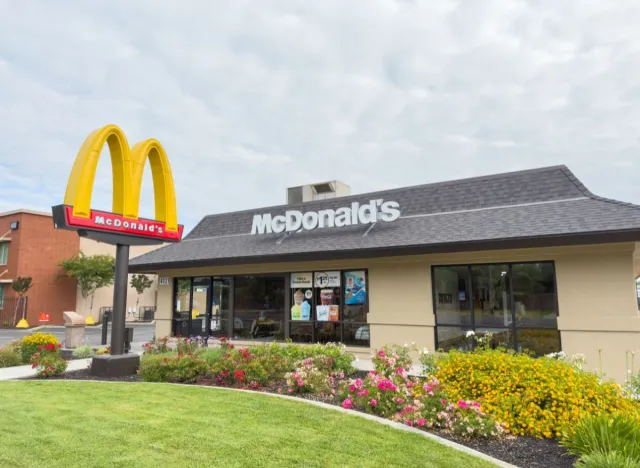
This fast-food myth was born from an unfortunate misunderstanding that had some serious ramifications. According to a 1989 piece from The New York Times, a rumor circulated for months that McDonald's was giving financial assistance to the Irish Republican Army (IRA), the paramilitary group that fought to remove British rule from Northern Ireland and reunify Ireland. McDonald's, which wasn't even sure where the claim had originated, repeatedly denied the claims.
People eventually learned that the rumor began when a financial talk show discussed McDonald's contributions to its employees' Individual Retirement Accounts, which is also commonly referred to as an IRA, the Times reported. Thus, the misunderstanding was born.
Starbucks employees try to spell your name wrong
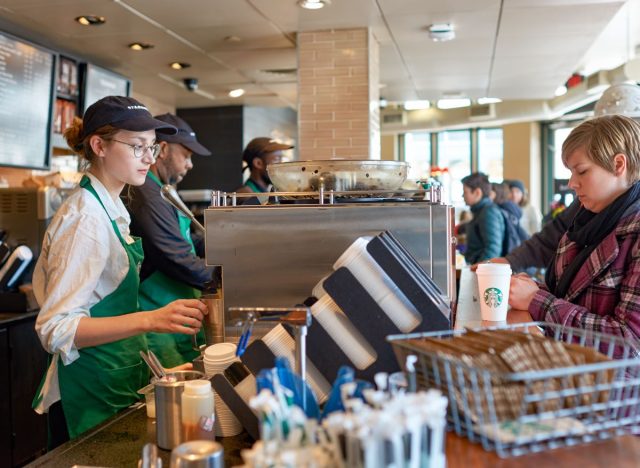
If you're a Starbucks regular, you've probably had a barista misspell your name at least once. The fact that it's such a universal experience among Starbucks customers has led some people to theorize that the company directed its baristas to do it on purpose. The reason? Because customers often post pictures of their humorously misspelled names on social media, thus driving more brand awareness for Starbucks.
However, Starbucks confirmed to Thrillist in 2016 that it never directed its employees to misspell customer names on purpose. Starbucks employees have also explained online that it's easy to misspell names in such a loud, hectic, and fast-paced environment, especially during busy times of day when there's a line out the door.
McDonald's shelled out a million dollars over a spilled drink
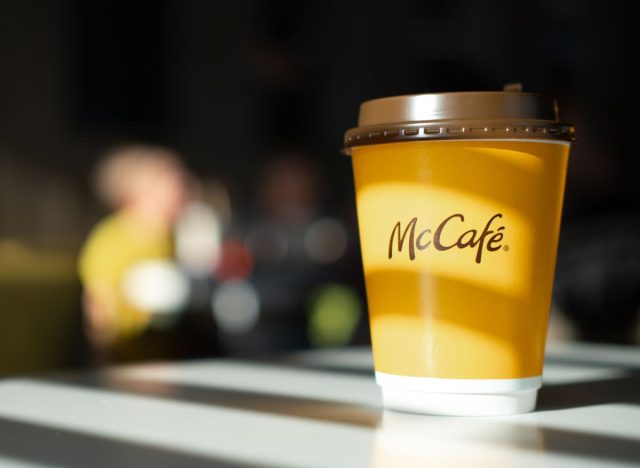
Of all the fast-food lawsuits that we've seen over the years, perhaps none are more famous than the one surrounding a spilled cup of coffee.
When Stella Liebeck took legal action against McDonald's after spilling a cup of the chain's hot coffee on herself, many people dismissed it as a frivolous lawsuit. However, this wasn't your average coffee spill. The coffee was so hot that it scalded the then-79-year-old Liebeck's legs and gave her third-degree burns.
Liebeck initially offered to settle the lawsuit for $20,000 just to cover her medical bills, NPR reported. But when McDonald's only offered her $800, the lawsuit went to court. According to the American Museum of Tort Law, experts testified that McDonald's coffee was 30 to 40 degrees hotter than what other companies served. The jury also learned that hundreds of other McDonald's customers had suffered burns from its coffee before.
The jury ended up siding with Liebeck's claim that the coffee was unreasonably dangerous and awarded her damages. So, when you know the true details of Liebeck's injuries and her legal battle, it's clear that the lawsuit wasn't really frivolous at all.
This story was originally published in June 2018. It has been updated with new information.









